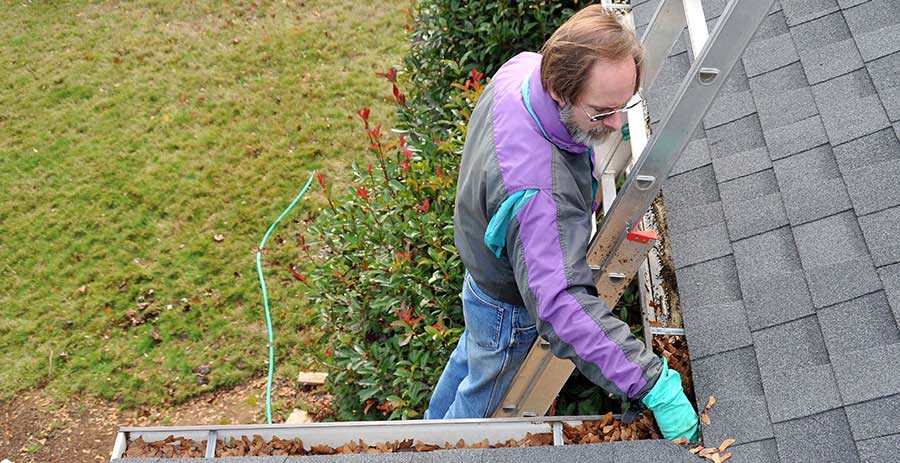
Nearly everyone looks forward to spring and the end of winter’s chill. And if you’re a first-time homeowner or you’ve recently purchased a new home, there are a few things you can do to prepare your home for the change of seasons. These home maintenance tips will help you keep your home looking its best and prevent the need for major repairs in the future. At Solarity Credit Union, we know that, with a new home purchase, it’s important to take good care of your investment. So here are a few simple ways to make sure that the winter hasn’t taken an unexpected toll on your home.
Check your gutters
As fall turned into winter, the trees around your home dropped their leaves. Unfortunately, many of those leaves will collect in your gutters. If you’re able, grab a ladder and some gloves and check out the metal channel surrounding your roof. Clean out any debris that has accumulated over the last few months. When gutters are clogged, water cannot move through the pipe, and your gutters no longer work as intended. It could cause water to overflow and damage your roof. If there is a lot of debris, remove as much as you can with your hands first, and then use a garden hose on a jet setting to clear out any remaining dregs.
Also, check to make sure that the downspout (the curved end of the gutter) is channeling the water that flows through the gutters at least five feet away from your home’s foundation. If you’re not comfortable doing it yourself, there are dozens of companies that will clean your gutters for you. Clearing them out after a season of leaf-dropping and storms will keep your foundation strong and prevent rot on your roof.
Check foundation vents
If your home has a crawl space, look around the foundation of your home for the vents. These look like small, rectangular spaces between the ground and your home. Just like your gutters, these spaces can become crammed with leaves and mud during the winter. When vents become blocked, cellars and crawl spaces lose their airflow. This can create a humid, closed environment in your home that is appealing to mold, insects and rot.
You can clean your vents by hand or with a powerful vacuum like a ShopVac. It’s also important to check the screens that cover the vents to make sure they’re fully intact. Any breach in the screen could provide an invitation to critters that you likely don’t want living under your home.
Replace filters
Furnace and air conditioning filters are meant to be changed every three to six months. It’s especially important, though, after you’ve been running the heat all through the winter. Each time your furnace engages and the blower pushes heat throughout your home, your furnace’s filter collects debris and allergens. At the end of winter, most homeowners find that their filters are completely packed with lint, dust and other detritus. If you have air conditioning, make sure that those filters are also clean and ready to go. That way, the first really hot day won’t take you by surprise—your home will be ready.
Test smoke and CO2 alarms
It is always important to have functioning smoke and carbon dioxide detectors in your home. It’s easy, though, to forget to make the rounds in your house and check to make sure each one is functional with fresh batteries. Spring is a great time to do this. With spring cleaning on many people’s minds, it may be easier to remember to perform this task. It may help to make yourself a written list of basic safety checks to perform each year when spring comes around. That way, you’ll be sure to remember and keep your home and everyone in it safe.
Repair windows and screens
Depending on where you live, winter may have been hard on the outside of your home, including your windows and screens. When spring rolls around and you want to air out your home, it would be an unpleasant surprise to find your screens torn or damaged. Depending on the amount of moisture you’re dealing with, you might find that your windows have become a bit sticky, warped or otherwise difficult to open and close.
There are simple fixes for a lot of these issues. However, if you found that your home was drafty in the winter, spring may be a good time to look at investing in new windows. Energy-efficient windows with a tight seal can help extend the life of your home and lower your energy bills, both in the winter and the summer.
If you’re interested in upgrading some aspect of your home but the cost seems out of reach, consider whether a cash-out home refinance or a home equity loan from a credit union, such as Solarity, is appropriate for you. Depending on your financial situation, you may be able to invest in your home without undue financial strain. Frequently, there are tax incentives for upgrading the energy efficiency in your home, as well.
Inspect the outside of your home
Home insurers recommend inspecting the crucial elements of your home at least once per year. This means taking a look at your siding to look for cracks or other weakened areas. Check the foundation for cracks, and look for any signs of mold. An inspection of your roof may require a ladder, but it’s crucial to identify any dark spots or broken shingles long before you develop a leaky roof. Lastly, if you have an HVAC system that is all or partially outdoors, make sure that it’s clear of leaves and accumulated mud so that it stays functional. Taking a day to make these checks could save you a lot of trouble in the future. Making minor repairs beats making serious, emergency repairs every time.
All of these tasks can help you get the new home you’ve purchased ready for spring and extend the life and value of your home. When and if it comes time to make major repairs and you want to look into ways to finance repairs or upgrades, the team at Solarity Credit Union is here to answer any questions you may have.What's your Solarity story?
We're on a mission to tell the stories of our members and how they are living their best lives. Do you have a Solarity story to share?
